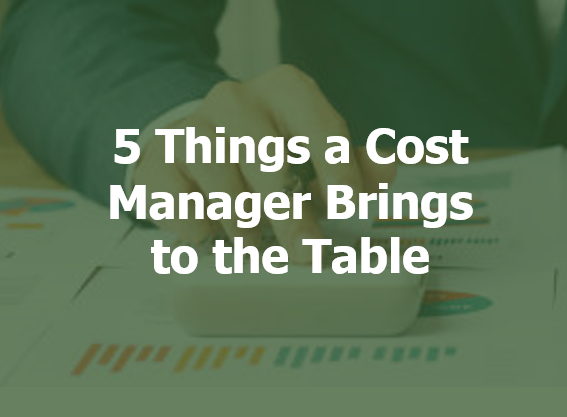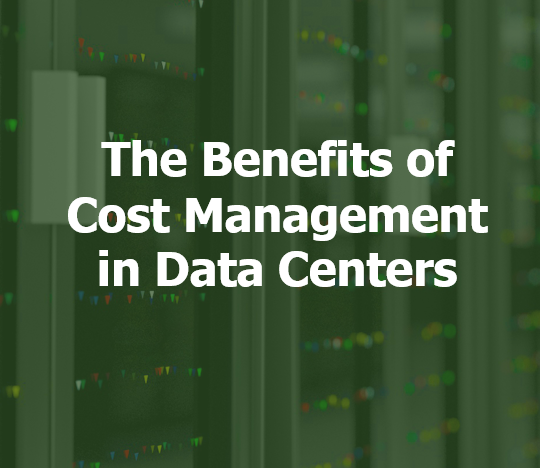5 Things a Cost Manager brings to the Table

Modern businesses always look for new ways to become more efficient and save money. For many companies, that is where a cost manager comes in. A cost manager is essential in project management, including planning, estimating, budgeting, financing, funding, managing, and controlling costs so that the wider team can complete their work within the approved budgeted cost.
Project cost management is crucial to forecast and manage costs effectively to keep projects within the approved budget. Without cost control, projects can exceed their budgets and become a loss. Cost management determines the project’s baseline and ensures the project runs within the budget and planned scope. Time, scope, and resource management are equally important in project management, but cost management ultimately affects a project’s outcome. The project manager’s proficiency in cost estimation lies in organizing tasks while keeping an eye on the costs to stay within the estimates.
Here is just a few of the benefits effective cost management brings to the table:
Identifying Opportunities
A cost engineer or cost manager can assist project managers in identifying the potential benefits that their project will bring to the organization, including cost-saving opportunities and opportunities to reduce expenses and maximize potential returns across the entire project.
The project cost manager can also identify vendors that offer the best pricing, considerably reducing material or labor costs. As most of the overall project budget is used for procurement, cost estimating and cost analysis are essential to ensuring that the project runs effectively within budget restrictions.
The cost manager will ensure that the project delivers its intended benefits by closely monitoring the progress and objectives, keeping the tasks on track, and identifying any potential pitfalls that could prevent successful project delivery.
Potential Cost Savings
A cost manager analyzes all the costs associated with the project and looks for opportunities to save money without compromising the quality of the project. The cost manager can identify opportunities to streamline processes, improve resource planning, reduce waste, or negotiate better prices with suppliers by evaluating project costs.
Many companies, for example, overinvest in technology that doesn’t necessarily contribute to the project’s success. Cost budgeting ensures that there are constraints that force project management teams to think twice about project expenses.
Money saved is money earned, and the funds that would have been spent on less useful tasks can be redirected to future projects and activities. Cost management closes the plug on leaking money and ensures that the company is better able to reach its overall fiscal goals.
The cost manager will keep a close eye on the actual vs. expected cost of every project by monitoring spending and implementing cost-saving measures wherever required, eliminating budget overruns that can negatively impact the project schedule or lead to cancellations.
Clarity Over Finances
Managing project costs is about more than tracking expenses. Effective cost control requires a disciplined approach to financial planning and accounting practices. A cost management professional can dramatically improve budget planning and transparency so that the right resources are allocated at the right time and place. They will also set upper limits for spending in the project’s budget so that teams are equipped and clear regarding spending boundaries. Cost managers can also provide regular financial reports to the project team and stakeholders to keep everyone informed of the project’s financial status.
A cost manager can help ensure that the project’s financial data are accurate and up-to-date, establish financial controls to prevent fraud or other financial irregularities, and ensure that all financial transactions are properly documented.
Peace of Mind
One of the most significant benefits of having a cost manager on the project team is the peace of mind that they can provide. By ensuring that the project stays within its approved budget and delivers its intended benefits, a cost manager can help to reduce stress and anxiety for the project team and stakeholders. They can also provide a buffer that eases the pressure on payments by managing costs carefully throughout the project life cycle.
A cost manager can manage expectations by communicating realistic timelines and budgets that reduce the risk of disappointment or frustration when the project does not meet unrealistic expectations.
The project manager will be provided with a breakdown of all cost estimates and activities that lead to overspending so that they can take necessary remedial action in time.
Less Financial Risks
Having a cost manager on the project team is an important part of risk management in your projects. By identifying potential cost savings opportunities and ensuring that the project stays within its approved budget, a cost manager can help to minimize the risk of financial losses. Cost management also leads to greater accountability among team members. Because the team is assigned definite tasks with clear deadlines and budgets, they are far more likely to avoid slippage and stay within the defined parameters.
In addition, a cost manager can help to ensure that the project’s financial records are accurate and up-to-date. Doing so can help control costs, prevent financial irregularities and reduce the risk of legal or regulatory issues.
In Conclusion
A cost manager plays a crucial role in project management and can bring significant benefits. From identifying cost-saving opportunities and providing clarity over finances to reducing financial risks and providing peace of mind, cost managers are essential to modern businesses. By managing costs effectively, cost managers can ensure that projects are completed within budget and deliver their intended benefits.
Get in touch with Churchill Cost Consultants if you would like to know more.










